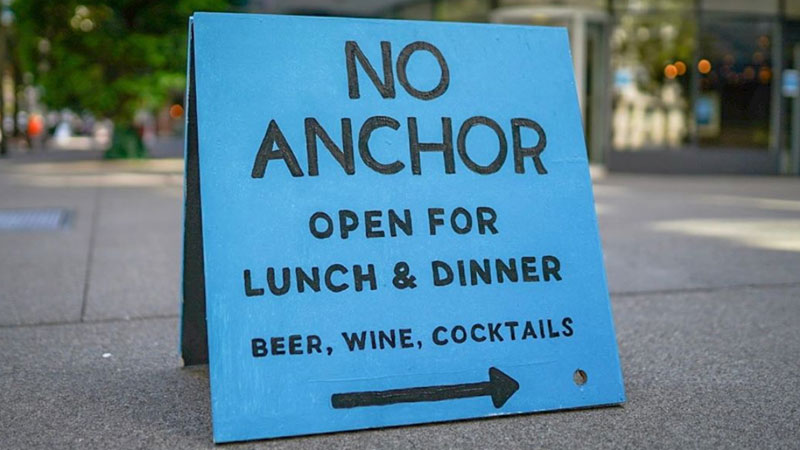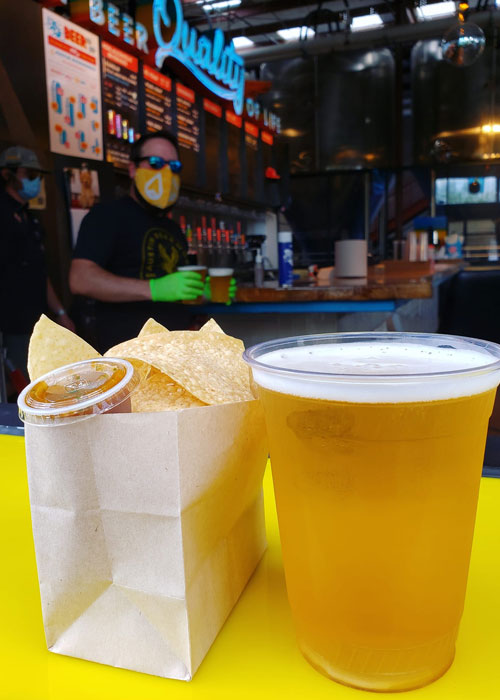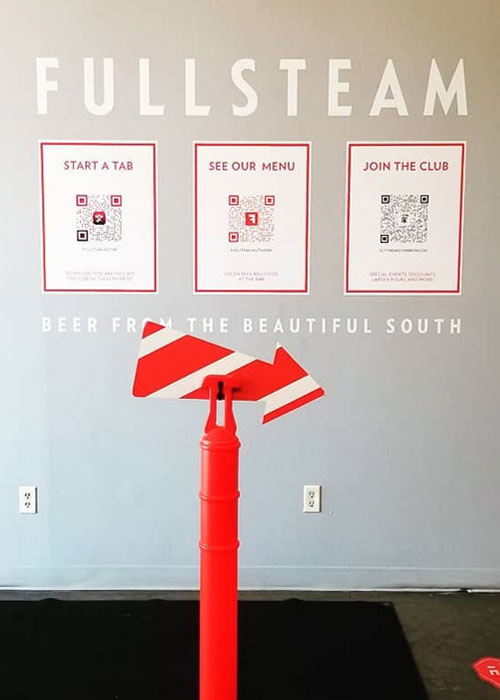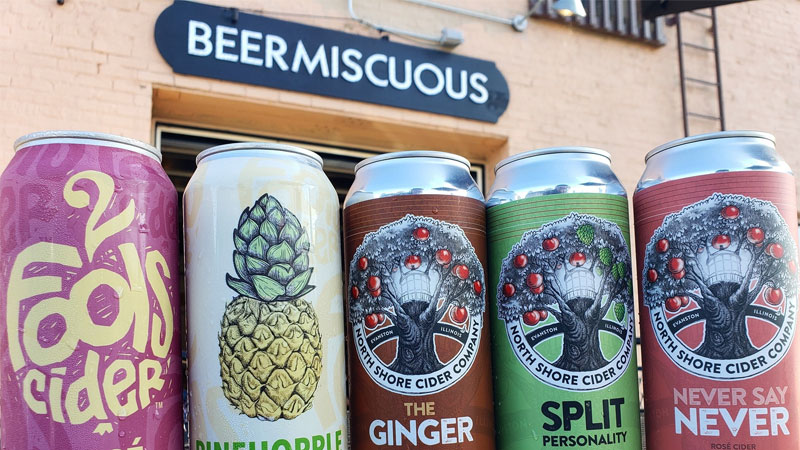As Covid-19 cases surge nationwide, U.S. state officials continue to face a complex problem: Keep residents safe, while mitigating the drastic economic impact of pandemic life. Among the countless industries navigating the seismic shift from pre-pandemic life, craft beer businesses are among the most affected — and the most complicated.
In May, as many as 3,600 of roughly 8,000 U.S. breweries were at risk of closure, according to the Brewers Association. This estimation has since improved, but the outlook is still bleak. Small breweries in particular are struggling against the fast currents of lockdowns, stay-at-home orders, and changing restrictions in their cities and states — even as parts of their businesses reopen. As a result, beer businesses long at a standstill are in a constant state of flux.
How small breweries and bars respond to each crisis and its accompanying, often contradictory orders could well determine which will make it through winter. Consequently, the health of the beer industry hangs in the balance.

It is, of course, difficult to look at the beer industry as one homogenous mass when the responses to health crises, infection and death rates, and economic impacts have differed so wildly from state to state. There is no “one size fits all,” due to the lack of coordinated federal response. Instead, it’s up to each business to navigate its next moves according to the changing whims of state officials and the safety of its staff and community.
In Texas, Austin Beerworks has been hit hard. According to the CDC, the state has one of the highest Covid-19 case and death rates in the country, at least partially due to population size; and a statewide stay-at-home order issued on March 31 meant approximately half the brewery’s roughly 1,000 retail accounts remained closed, with only 25 percent tentatively reopening in August, Austin Beerworks co-founder Michael Graham estimates. The brewery’s taproom has remained closed since March 17, with only some outdoor service taking place.

At Austin Beerworks, requirements such as outdoor service greatly impacted the brewery’s sole on-premise sales opportunity. “Our inside taproom has been closed since March 17,” Graham says. “We have an outdoor patio that has opened and closed several times now, based on back-and-forth executive orders and rule interpretations by the governor’s office and the Texas Alcoholic Beverage Commission (TABC). Per the latest rule interpretations, we’re currently able to operate our patio, as long as more than 50 percent of our sales come from non-alcohol-related items.”
“The loss of nearly all of our on-premise accounts [such as bars and restaurants] has been partially compensated by increased sales through our off-premise accounts [such as grocery and convenience stores],” Graham says. “We’re doing better than almost any other brewery I’ve spoken with.” Despite this, he adds, “volume sales are currently down about 20 percent for the year.”
Although some states have relaxed notoriously strict distribution laws, allowing breweries to explore previously closed direct-to-consumer sales avenues, including beer delivery and bottles to go, this has not been the case in the Lone Star State. “The Texas Craft Brewers’ Guild has been lobbying to allow breweries to ship and deliver beer directly to consumers, but the Texas governor has so far been unwilling to allow new avenues of sales for Texas breweries during the pandemic,” Graham says.
Not Just a Phase
If anything is consistent across the country, it is rapidly changing and inconsistent guidance and policy.
North Carolina is currently in Phase 3 of its three-phase lockdown plan. “Phase 2 gently lifted the stay-at-home order and opened some in-person businesses,” says Erik Myers, director of brewing operations at Durham’s Fullsteam Brewery. “Restaurants are allowed to operate at half capacity, and bars are not allowed to be open — though, curiously, brewery taprooms are.”
Fullsteam’s brewing operations, considered an essential service, have continued since the lockdown order was issued in March. As an essential service, the brewery was able to offer food and beer to go during Phase 1 — thanks to a kitchen renovation completed only the week before lockdown — and now is open at half capacity as a restaurant, with appropriate distancing measures.

“When the lockdown hit in March, we sort of got our bearings and then laid off a significant portion of staff while we got a handle on what the market was going to look like,” Myers says. A rise in home drinking saw a sharp spike in grocery store sales, which, along with a government-issued Paycheck Protection Program loan, “allowed us to bring our staff back into work about six weeks after the initial layoff, and we’ve been brewing at full capacity ever since.”
The biggest challenge for Fullsteam, as at Austin Beerworks, has been other bars and restaurants remaining closed. “We’ve been having a really hard time projecting demand for draft product because the market has been incredibly inconsistent,” says Myers. “My biggest fear is that we’ll begin to see supply chain issues because of this, and aside from a little slowdown in incoming orders, we haven’t had to deal with ‘out-of-stocks’ on our supplies yet.”
Meanwhile, in Washington State, where the first coronavirus case in the country was recorded on Jan. 21, Seattle remains in Phase 2 of the state’s four-phase reopening plan.
“Recently, any indoor bar service has been shuttered, and inside dining at restaurants [is] limited to members of the same household,” Dave Riddile, general manager at No Anchor Bar, says. The Seattle bar and restaurant closed for two months from the time of lockdown. After reopening for just one day a week for to-go service, and then three days a week, Riddile and his team cautiously opened the patio at the beginning of July, and have been open all week since.
“The closure of inside bar service, unless you’re a restaurant license holder, has felt a little Prohibition-y and arbitrary,” Riddile says. “It puts this undue responsibility on restaurant workers to have to determine if guests live together, which shouldn’t really be their job. Also, I don’t completely agree that this is somehow safer than friends meeting and having a meal together indoors — both scenarios present inherent dangers at the moment, which is part of the reason we have yet to open our dining room to guests.”
Riddile, who describes No Anchor as “somewhere between barely scraping by and business as usual,” is confident the industry will continue to lose fantastic restaurants and bars as winter approaches. “The good thought: I also think that our industry is resilient and will continue to work our asses off to ensure safe employment for our people,” he counters.
Kicked to the Curb(side)
Almost all on-premise beer venues are in a similarly see-sawing situation. Chicago’s Beermiscuous, a beer-focused cafe, was ordered to close, before being considered essential and allowed to reopen only for off-premise sales. Shortly thereafter, the cafe was allowed to return to on-premise consumption, before then being later reduced to off-premise once more. At press time, Beermiscuous remains open for to-go sales and on-site consumption in its sidewalk “cafe,” with distancing measures in force, and online ordering and contactless pickup also in place.
“We’re scraping by,” says Beermiscuous co-owner Virginia Thomas. “It forced us into being packaged beer only for most of the pandemic, and that has smaller margins. Usually, (by order of our license type: Tavern), we can only have 49 percent or less of our business be to-go sales. Our hours have also been forcibly reduced: Chicago makes all to-go alcohol sales end at 9 p.m. now.”
Like Riddile, Thomas has felt little support from the local government. “The only laws that have been changed that favored bars are allowing cocktails mixed to go — we don’t do cocktails — and allowing bars without a food license to apply for a sidewalk cafe permit, which we’re in process of.” But, she says, “it costs $300 just for permits, ours isn’t approved yet, and summer is quickly disappearing.”
Thomas’s feelings are indicative of the attitudes of many: “We’re in for a long, hard winter,” she says. “A lot of places won’t make it. It’s grim, but true.” Reopening indoors will come with its own added stressors: With a growing backlash against masks, symptomatic of general tension and the conspiracy theories surrounding the pandemic, Thomas is feeling the public’s anxiety, adding, “Everyone is more on edge, selfish, and threatening, it seems.”
Bracing for What’s Next
Throughout the beer industry, many tell a similar tale of the last several months: a mix of inconsistent official communication, loss of sales, a reliance on to-go service, reduced on-premise capacity, fear for employee and personal health, and innumerable other stressors. This, coupled with a burgeoning recession and ever-looming threat of depression, means many businesses won’t survive.

In the face of all of this, some remain hopeful. At Fullsteam Brewery, Myers is focusing on keeping company culture upbeat, aware of the havoc this pandemic is wreaking on mental health.
“It’s mostly a matter of trying to anticipate ways that we can provide some social relief for our employees and make them feel supported. We’ve done a handful of online beer tastings and social hours, and we try to do in-person safe and socially distant tastings and other educational opportunities,” says Myers. “To be honest, it’s difficult. Not everybody is an extrovert and social gatherings don’t feel safe to people — or they don’t want to hang out with work people (especially their boss) outside of work. For us, it’s been important to listen and really hear when people say they need something and do whatever we can within the auspices of the business to help out.”
Graham’s approach for Austin Beerworks is more pragmatic: “Think long-term,” he says. “Don’t take unnecessary risks to chase money. Don’t cut corners to save money. These are very difficult times, but they will pass.”
At No Anchor, Riddile and his team are gearing up for the rainy season and prepping the space for inside dining. Like so many bars, breweries, taprooms, and restaurants relying on the outdoors, safety and viability are equal, inseparable concerns. “No business is worth the lives of the people that make it run,” Riddile says. “We may have a few more long months ahead of us, but if we keep doing our best in these incredible circumstances, we’ll make it through to the other side.”
Things are looking up for Beermiscuous, if only a little: “Our sidewalk cafe was approved on Sept. 21. We got it up and running, and did a soft open on the 23rd, and fully opened on the 24th,” Thomas says. “And the mayor just announced we can reopen indoors.”
This story is a part of VP Pro, our free platform and newsletter for drinks industry professionals, covering wine, beer, liquor, and beyond. Sign up for VP Pro now!
